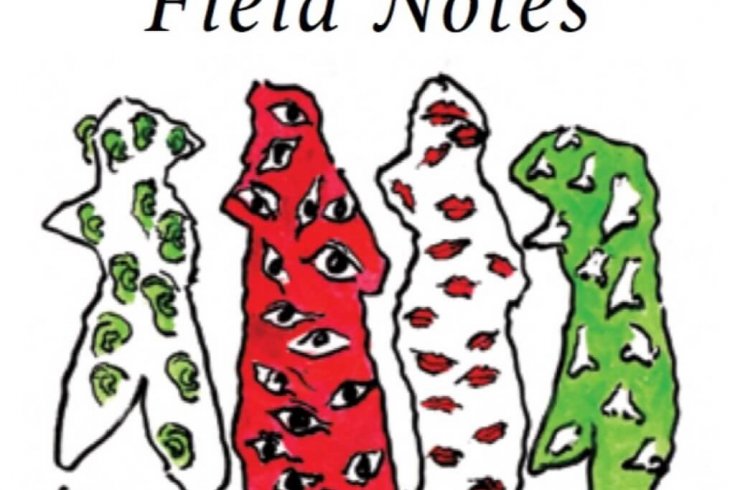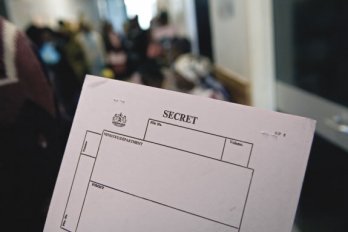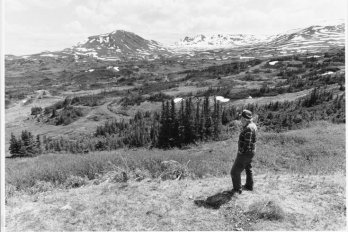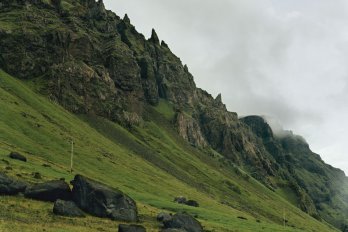freetown—On a dusty pitch, on the edge of one of the poorest countries in the world, a one-legged man is playing soccer. There is skill here. A trapped ball, a swift manoeuvre away from prying legs, a crisp pass onward. The ball skips away and he chases after it, fists clenching the crutches that give him flight. Soccer is usually a quiet sport; barely a whisper escapes players’ cleats as they sink into the earth below. Here, the metallic crutches make a clicking sound under the weight of bodies in motion. The referee hollers and the ball rolls off the field. Mohamed Sillah Kamara stops the chase and hobbles back to the centre of the field, laughing but still determined. This game is not over.
Kamara is surrounded on this beachside field along the Atlantic by other men—sons and brothers, husbands and fathers—who lost an arm or a leg in Sierra Leone’s eleven-year civil war, which started in 1991. They are part of the country’s Single Leg Amputee Sports Club (slasc), founded as the fighting was winding down with the help of Dee Malchow, a retired nurse from Seattle, Washington.
Standing pitch-side as the players jostle for the ball, “Mommy Dee,” as the players call her, marvels at how far the men have come. Her gaze traces the play and she has a sudden realization. “I can’t believe this,” she says. “This is the first time I have seen them play [in Sierra Leone].”
Malchow, a sixty-one-year-old grandmother, is an amputee herself, a victim of a water-skiing accident that damaged her right leg beyond repair when she was nineteen. This is her second trip to Freetown; she first visited Sierra Leone in 2001 to participate in a Southern Baptist mission to counsel local pastors who had been traumatized by the war. An amputee camp in the capital of Freetown was brimming then with men and women who had been wounded or lost limbs during the war. At its peak, more than 200 amputees lived in the camp, along with their families.
Malchow, who used to play for the United States amputee soccer club, suggested forming a team to strengthen the amputees’ bodies and keep their minds off heavier things. The idea took hold, and now eighty-two amputees play on three teams across the country—two in Freetown and one in the city of Makeni.
The teams play matches in the morning, before the scorching sun reaches its peak. Afterward, players spend hours debating their performances. “Football has become a way of engaging the mind,” says Mambud Samai, a Freetown pastor who coordinates the slasc. “It’s created a fellowship among men.”
Before Kamara joined Freetown’s inaugural soccer team, the twenty-seven-year-old had a promising future as a tailor in the village of Komrabai Njlar, fifty kilometres northeast of the capital. He was a popular young man with a Cheshire-cat grin. But everything changed one May evening in 1998. The sun was setting, he remembers, when suddenly and without warning Komrabai Njlar was attacked by rebels. They fired indiscriminately as villagers raced into the bush, crying out to alert others. Kamara dropped the garment he was working on in his tailor shop and joined the frantic scramble for safer ground. As he ran, a bullet torpedoed through his left leg, just under his kneecap, and emerged on the other side to hit his right leg, damaging it slightly.
He dragged himself half a mile into the bush, where he stayed, terrified, for three days without food or medical attention. He prayed to God, begging for peace through death. When the rebels had finished pillaging the town, a friend rescued Kamara and took him to a hospital in Freetown. The bullet had caused an infection that had spread down the leg. The limb would have to be amputated. “When the doctor told me, I refused,” Kamara says. “I said no, I will not accept to amputate my foot.” The doctor was adamant—amputate or risk death.
From then on, life changed quickly. Kamara moved into the Freetown amputee camp, where he met his wife, Hawa, the daughter of a woman who had been wounded in the war. Kamara mourned his leg, but realized he was lucky—some people had lost more than one limb. So he forged on. “If you sit down at home, shouting, ‘Oh I have this problem, people come to my house and help me’ . . . No,” he says. “You have to walk. You have to try.”
Kamara now lives with his mother, wife, and daughter, Surria, in a two-bedroom dwelling built by ngo workers in the town of Masiaka, about sixty kilometres east of the capital. When he’s not busy in Freetown playing soccer, taking computer classes, or meeting with immigration officials (he is trying to move his family to Canada), he sews garments to bring in money. Operating on a shoestring budget that relies on donations from ngos and individuals, the slasc provides transportation to and from practices and weekly games, refreshments afterward, and some financial assistance for the players. “We see football as a vehicle so we can address all the economic needs of amputees,” says Samai.
Indeed, the sewing machine Kamara uses was purchased with bonus money received during a sponsored trip to England two years ago—a tour that made him and his teammates the talk of their towns. “When we came back from England, people were admiring us,” Kamara says. ” ‘Wow, you boys were in England?’ they would say.” In August, some of the country’s best players travelled to Brazil for the Amputee Soccer World Championships.
When the lustre of globetrotting wears off, these men are left to make their way in a country that will bear the scars of war for generations to come. Kamara focuses on looking forward. He has taught many of the young amputees on his team how to sew and has done the same for thirty former rebels, known as the “ddr boys,” taking part in a six-month tailoring course under Sierra Leone’s Disarmament, Demobilization, and Reintegration program. He was not afraid of them and even befriended some.
This is how a country heals. “I will forgive because we want peace in the country,” says Kamara. “But we are not going to forget.”





